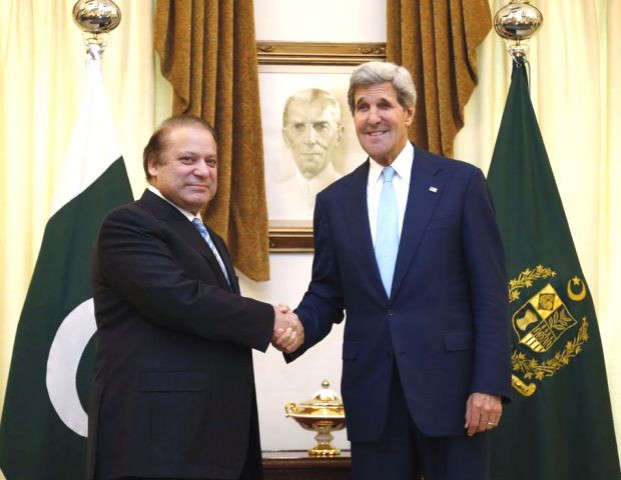Then, on July 31, it finally happened—US Secretary of State John Kerry made his long-awaited trip to Pakistan.
Alas, there were few major achievements.
However, there were two notable takeaways. At first glance, each one may seem to be a boon for US-Pakistan ties. Yet at second glance, one comes away significantly less optimistic.
The first takeaway is that Kerry and his Pakistani interlocutors are really serious about restarting the Strategic Dialogue, which has been suspended for two years.
This is undoubtedly a good thing. Deep and sustained dialogue builds trust, which is sorely lacking in the bilateral relationship. It also allows Washington to partner with Islamabad on non-security matters, which are largely free of the hostility and tensions that plague the dicey security relationship—and therefore provide foundations on which to build a long-term relationship for the post-2014 era.
Ah, but if only it were that simple.
Washington has few strategic relationships—wide-ranging, foolproof partnerships overflowing with so much trust that intelligence-sharing is taken for granted. Those relationships that do exist (think the US-Israel and US-UK relationships) can easily withstand any bilateral bumps.
The US-Pakistan relationship, by contrast, is not blessed with a large reservoir of goodwill to weather crises. Cursed with unrealistic expectations, divergent interests, and mutual mistrust, US-Pakistan relations are volatile at best and dysfunctional at worst. It wouldn’t take much to bring a resurrected Strategic Dialogue to a screeching halt—recall how the talks were suspended after a series of crises in 2011.
This isn’t to say the Strategic Dialogue isn’t worth restarting; both nations are certainly better off with a deeper relationship. It would be folly for Washington to take lightly a nation that controls critical supply routes to and from Afghanistan, and that exerts influence over the Afghan Taliban—and that, looking to the long term, is one of the world’s most youthful, populous, and strategically placed countries.
Likewise, it would be silly for Pakistan to shrug off a superpower that provides so many essential things—from export markets and economic assistance to military hardware.
But let’s be realistic. How seriously can we take a strategic dialogue involving two nations that arguably share only one major strategic interest—stability in Pakistan—and differ wildly on how to achieve it?
This brings me to the second key takeaway of Kerry’s whirlwind visit: The conciliatory comments on, of all things, drones. The secretary of state stunned the world by saying in a PTV interview that,
“I think the [drone] program will end as we have eliminated most of the threat… I think the president has a very real timeline and we hope it’s going to be very, very soon.”
So does this mean a huge source of bilateral tensions is poised to disappear? Well, yes, if Kerry’s statement were actually true. In reality, it is most assuredly not true at all. Unless, by “very very soon”, Kerry meant after 2014.
Washington won’t soon end what a top US official in 2009 called “the only game in town” capable of targeting al Qaeda’s leadership, and what is regarded by Washington today as the most effective option to eliminate Pakistan-based militants that attack US troops in Afghanistan—as well as civilian, government, and military targets in Pakistan.
So why, then, did Kerry make such a questionable comment? Was he simply exhausted, given that his Pakistan visit was directly preceded by a gruelling period of intensive diplomacy to restart Mideast negotiations? Did he slip up and revert to the old ways of his senate days, when he could freely voice his largely pro-Pakistan personal sentiments (unlike now, when he represents the White House as Washington’s chief diplomat)? Or was Kerry subconsciously influenced by the anti-drones tirade delivered to him by Imran Khan earlier in the day?
I frankly don’t know the answer. Perhaps Kerry was simply looking for ways to keep alive the warming trend in US-Pakistan relations—particularly as both sides look ahead to a visit Nawaz Sharif will apparently be making to Washington later this year.
Overall, what strikes me the most about Kerry’s visit is how much it was a reflection of the bilateral relationship on the whole. It was volatile (how many high-level bilateral visits are rescheduled twice?), opaque (strikingly little emerged about what was actually discussed), and a bit melodramatic (that the trip being billed as “unannounced” is a bit much, given that numerous media outlets had reported it several days in advance).
So was it a successful visit? Sure. Yet will it lead to greater things? Stay tuned—though we might want to keep our expectations in check.



COMMENTS
Comments are moderated and generally will be posted if they are on-topic and not abusive.
For more information, please see our Comments FAQ